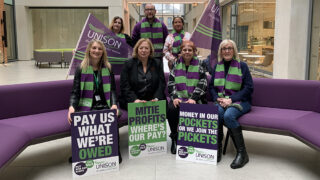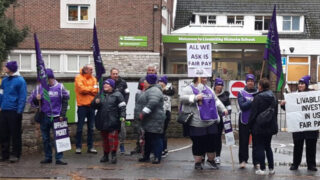There remains an “urgent need” to raise the national minimum wage to the level of a “proper living wage”, UNISON said today, as it made its annual submission to the Low Pay Commission.
In its evidence, UNISON calls on the commission to honour its 2014 commitment to seek “significantly faster increases in the minimum wage”, which will deliver “major improvements” for workers aged under 25 and apprentices.
The union also urges commissioners to stick to a “straight path” in uprating the national living wage to reach the target of 60% of median earnings by 2020.
The commission is the independent body that advises the government about both the national living wage and the national minimum wage.
UNISON’s submission, for 2017, makes reference to the economic uncertainty created by the EU referendum result, which the government has said could last a decade.
On public service pay trends, the union notes that wages have been “held down more tightly” than general wages across the economy, because of the 1% pay cap that is due to continue into 2020.
It states: “Local government contains the largest pool of low-paid workers directly employed by the public sector. But low pay is vastly extended across the public sector by privatised ancillary services and the low pay norms of the social care sector.”
Another key aspect of UNISON’s submission is on enforcement of the minimum wage – with the number of workers owed arrears for underpayment more than doubling in 2015-16.
UNISON believes that the “ultimate goal” for national minimum wage policy in the UK should be for the minimum wage to be raised to the level of the UK living wage announced annually by the Living Wage Foundation – harmonised into a single rate across all age groups.
The union’s head of policy Sampson Low commented: “There is still an urgent need to raise the minimum wage to a proper living wage. We believe this is not only fair, but boosts local communities and lowers the government’s tax credit bill.”
Under the current national minimum wage system, UNISON’s recommendations include:
- the national living wage target of 60% of median earnings should be increased to the higher 60% of median male earnings (which would also help close the gender pay gap);
- the April 2017 increase in the national living wage should be at least £7.60/hour;
- the April 2017 increase in the minimum wage should at least match the increase to the national living wage;
- the commission should call on the government to ensure that additional financial provision is made to fund the projected increase in the living wage up to 2020, for those working in public services.
- the commission should assess the effectiveness of the current enforcement regime, including implementation of naming and shaming.







